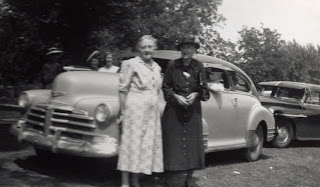A Scared Father, a Smart Son, and Stonewall Jackson originally posted in 2014 on July 27. Today marks 99 years since Uncle Jess's birth on July 31, 1923 making it the perfect time to reprise this remembrance of my grandparent's fourth-born son.
In 1925, when Jess was around two years old, he had mastoiditis, an infection in the bone behind the ear resulting in painful swelling and serious in nature. Edmund, Jr., as a little six-year-old boy, recalled vividly hearing his younger brother crying in excruciating pain. Jess was even hospitalized for a night or two. Hospitalization was unheard of back then. The critical illness that ravaged his tiny body really frightened their father.
From the incident of that illness forward, Edmund, Sr. favored Jess, not requiring him to work as hard as the other children. His sister Ella said Jess was allowed to read the newspaper while the others worked. When I asked my father, Edmund, Jr., about about Jess reading the newspaper, Dad simply said, “Well, Jess always kept up with the funny papers.” Some reported that their father believed Jess was brighter than his other children.Jess’s chore was to walk the milk buckets to the barn. Sometimes his father would holler for the much-needed buckets four or five times but never got too tough on Jess.
My grandpa, Edmund, Sr., was perceived as much tougher on the kids than Grandma, but this was an example of how closely tied his heart was to his children and how he never recovered from the fear of losing Jess and so sympathized with the pain he endured. Thoughts of his oldest son’s death around the age of two must have flooded his memory as he saw Jess so severely ill.
Uncle Jess was very knowledgeable about many subjects but dearly loved the study of the Civil War. We shared an admiration for General Thomas “Stonewall” Jackson and some of our last visits focused on discussions about Jackson, the Virginian general. Even though Jess, like Grandpa, was a staunch supporter of the party of Lincoln and of course, the Union, he commented to me about Jackson, “He was a good guy.”
Ironically, Jess and General Jackson shared some similarities in their death. Jess, like Stonewall Jackson, died in the spring of the year. Both of them also passed away on a Sunday. He had another unusual connection with General Jackson from an early age. Dad recounted this story.
 |
| Group Photograph taken at the Woodland School in the Big Bend Community. Jess is seated on the front row the fourth student from the right. |
 |
| Gammy and PawPaw |
 |
| Jess on the first tractor owned by his father. |

.jpg)




